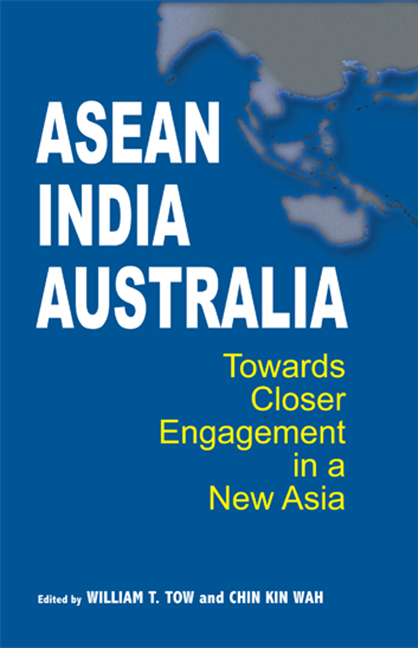Book contents
- Frontmatter
- Contents
- Preface
- Contributors
- List of Abbreviations
- Introduction
- Part I Emerging Regional Security
- 1 Emerging Regional Security Architecture: An Australian Perspective
- 2 Emerging East Asian Regional Architecture: ASEAN Perspectives
- 3 India in the Emerging Asian Architecture: Prospects for Security Cooperation with ASEAN and Australia
- 4 ASEAN, Australia, and India in Asia's Regional Order
- Part II Energy Security
- Part III Climate Change
- Part IV Maritime Security
- Part V Law Enforcement/Combating International Crime
- Conclusion
- Bibliography
- Index
3 - India in the Emerging Asian Architecture: Prospects for Security Cooperation with ASEAN and Australia
from Part I - Emerging Regional Security
Published online by Cambridge University Press: 21 October 2015
- Frontmatter
- Contents
- Preface
- Contributors
- List of Abbreviations
- Introduction
- Part I Emerging Regional Security
- 1 Emerging Regional Security Architecture: An Australian Perspective
- 2 Emerging East Asian Regional Architecture: ASEAN Perspectives
- 3 India in the Emerging Asian Architecture: Prospects for Security Cooperation with ASEAN and Australia
- 4 ASEAN, Australia, and India in Asia's Regional Order
- Part II Energy Security
- Part III Climate Change
- Part IV Maritime Security
- Part V Law Enforcement/Combating International Crime
- Conclusion
- Bibliography
- Index
Summary
INTRODUCTION
The debate on the construction of a new security architecture in Asia takes place in the context of two broad trends. One is the potential impact of a rising Asia on the international system. There is a widespread sense today that the rise of China and the emergence of India might mark a fundamental power transition in the global order, but there is less agreement on whether the transition will be peaceful or violent. The focus of this chapter is on the other question — whether Asia can effectively manage the current change in power distribution within Asia. Linked to this is the main thrust of this chapter on New Delhi's likely role in the building of a new order in Asia and the prospects for greater political and security cooperation among India, ASEAN, and Australia.
The intellectual debate on the future of Asian security is dominated by two basic schools of thought. One school suggests that great power rivalry in Asia is inevitable. It insists that the strategic future of Asia might resemble Europe's past. The other school hopes for a “liberal peace” of sorts, rooted in the growing economic interdependence in the region. The sense of a unipolar moment in world affairs and America's positive relations with all the other powers seemed to reinforce the proposition that traditional power politics might be less salient in Asia's strategic future. The overarching presence of nuclear weapons, too, appears to rule out the prospect of major conventional wars that a rising Europe had to endure. The principal security challenge, according to this school, is to compensate for the under-institutionalization of the Asia Pacific region.
Most Asian states would like to avoid the outcome of an unstable balance of power system in Asia. There is indeed a widespread consensus in Asia that creating a new framework of multilateralism in the region would help constrain the competition among the major powers. ASEAN has led the new efforts towards economic integration and initiated the construction of the mechanisms for cooperative security in Asia. The ASEAN Regional Forum (ARF) and the East Asia Summit (EAS) process were among the principal results. A series of recent developments, however, have begun to challenge the hope that Asia was moving forward, if slowly, towards effective multilateral arrangements for peace and prosperity in the region.
- Type
- Chapter
- Information
- ASEAN-India-AustraliaTowards Closer Engagement in a New Asia, pp. 40 - 57Publisher: ISEAS–Yusof Ishak InstitutePrint publication year: 2009



